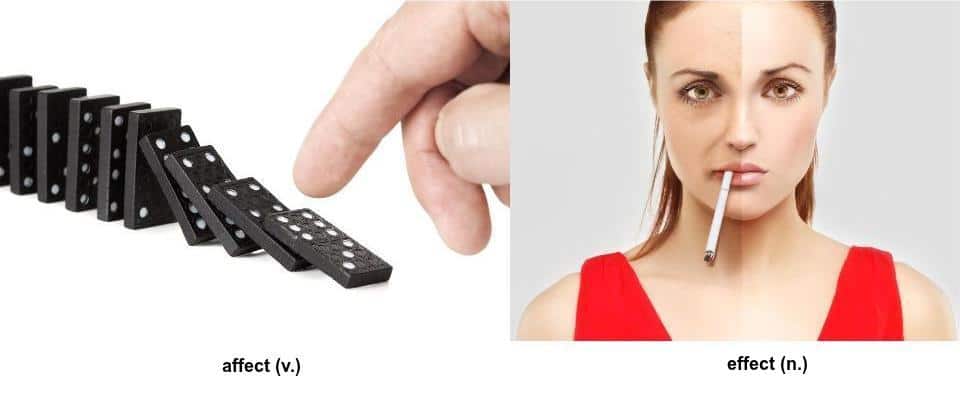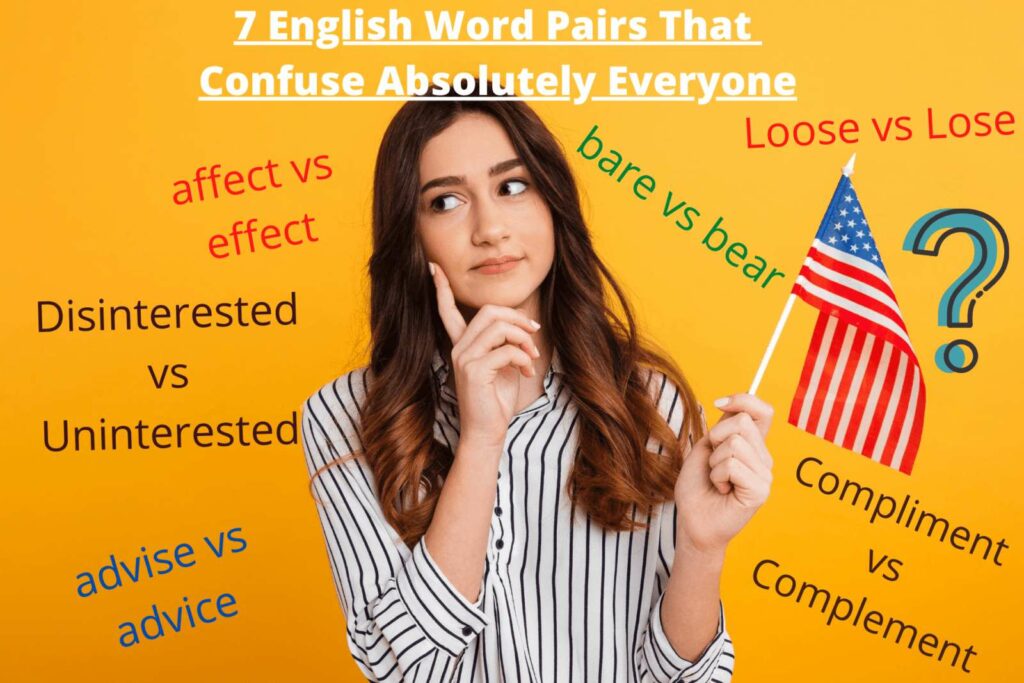7 English Word Pairs That Confuse Absolutely Everyone
Find the 7 top confusing words that may affect (OOPS effect!!) your IELTS bands. Loose vs lose, Resign vs re-sign, Advice vs advise, Affect vs effect, Compliment vs Complement, Disinterested vs Uninterested, Bear vs Bare. Improve your speaking and writing with a thorough understanding of these confusing words.
English Word Pairs That Confuse
Lose vs Loose

Lose – pronounced with a “z” sound – is a verb meaning to not have something anymore, to be unable to find something or to not win. You lose your cell phone, or you lose your way while driving somewhere.
I don’t want my football team to lose the game.
She will lose her money if she gambles with it.
Loose – with an “s” sound – on the other hand, is an adjective that means free, unattached or not tight. It’s also a verb meaning to untie or let go of something.
The door handle fell off because it was too loose.
A loose sweater feels very comfortable.
Resign vs Re-sign

Resign — without the hyphen — means to quit your job and the “s” is pronounced like a “z.”
My boss didn’t want to increase my salary so I decided to resign. This will be my last week of work.
Re-sign — with the hyphen — means to sign a contract again and it usually also means that you’ve decided to stay in your current job! In re-sign, the “s” is pronounced as an “s,” and you emphasize the first syllable.
I love my current job, so I happily re-signed for another year.
Advice vs Advise

Advice — with an “s” sound — is a noun. You can give your friend some advice.
My father gave me one piece of advice – “Always be on time.”
Advise — with a “z” sound — is a verb. With this word, you can advise your friend. The meaning of the two words is basically the same.
She advised me to invest my money more carefully.
Affect vs Effect

Again, with these two words the main difference is grammatical, although they’re pronounced slightly differently. Usually, affect is a verb and effect is a noun, and they’re used when talking about the results or consequences of particular actions.
I’m worried that your lazy habits will affect your studies (your lazy habits will have a bad effect on your studies).
Before you start an argument with your boss, consider the effects of your actions (before you start an argument, consider how your actions will affect the situation).
Compliment vs Complement

Compliment — If someone says to you “I really like your shirt” then they’re complimenting you. In other words, they’re giving you a compliment. As a verb and noun, compliment means saying something nice about someone.
I complimented my sister on her delicious cooking (verb).
Practice with Expert IELTS Tutors Online
Apply Code "IELTSXPRESS20" To Get 20% off on IELTS Mock Test
Complement — is when two things go well together, or complete each other. This word is often used in food and in fashion to describe matching styles or ingredients.
My blue tie really complements my white shirt (my blue tie and white shirt go well together).
Disinterested vs Uninterested

Many native speakers use these two words with the same meaning – bored, or not interested. That’s certainly the meaning of uninterested, but it’s not the meaning of disinterested. The real meaning of disinterested is impartial, objective or not taking a side in an argument. A judge hearing a court case should be disinterested, but definitely not uninterested!
The children wanted to play outside and were very uninterested in doing any studying.
Sometimes a stranger can make a disinterested and fair decision more easily than a family member.
Bear vs Bare

Bear — as a verb — has several meanings, including to hold up or support a heavy weight and to suffer or endure difficulties. We’re not talking about big hairy bears that live in forests.
Don’t stand on that old chair, it cannot bear your weight.
Bare, meanwhile, is an adjective that means naked or uncovered, or a verb which means to uncover or reveal.
Visitors to the temple must not have bare arms or legs, so wear long pants and a jacket.
Also Check: Tips to Ace Your IELTS Test





3 thoughts on “7 English Word Pairs That Confuse Absolutely Everyone”
Thank you
Thank you. Useful indeed